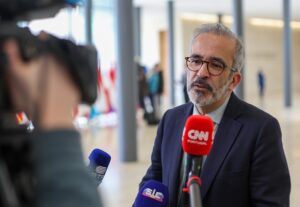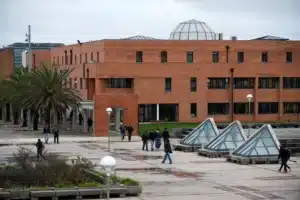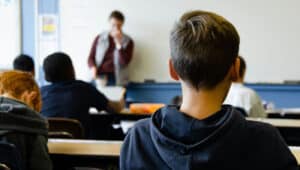National Education Councils calls for ‘innovation’ in teaching
A report by the National Education Council has confirmed what everyone already knows: there are increasing numbers of pupils in Portugal (the school drop-out rate has been essentially ‘fixed’) but time in the classroom does not correspond to increased knowledge, far from it.
Says the report, there are many gaps in learning, with the principal problem being secondary education where one in 10 pupils still fall behind (9.8%).
In other words, there may well be ‘an increasing number of qualified young adults’, but the term ‘qualified’ does not fare well off paper.
“There are high percentages of students who do not learn what is provided for in the curriculum”, president of the CNE Domingos Fernandes warns, highlighting as “particularly worrying and serious” the situation of the youngest, who have shown great difficulties in writing and mathematics.
“The country needs to implement a programme specifically aimed at improving the quality of teaching and learning in the early years,” he explains, defending measures that guarantee initial and ongoing training for teachers.
It is also necessary to invest in the organisation and pedagogical functioning of schools and in support, monitoring and evaluation systems, says Fernandes, stressing: “Students cannot be left behind, the diverse support that students need cannot be neglected and those who show difficulties cannot just be excluded”.
The creation of a policy focused on improving teaching and learning must involve “initial and ongoing teacher training programmes that truly take into account the knowledge and skills that need to be developed, especially with regard to scientific knowledge inherent to the subject or subjects taught, pedagogical knowledge, knowledge of the curriculum and, in general, pedagogical innovation”.
The problem is also felt in higher education (universities) and Domingos Fernandes considers it urgent to “invest deliberately and consistently in improving the pedagogical knowledge of its teachers”.
“It is necessary to innovate in teaching and assessment practices and create environments in which students are challenged to think, to be autonomous, to exercise critical thinking and creativity and to be able to mobilise, integrate and use knowledge and skills to solve a variety of problems”, he stresses.
The report also warns of the need to continue combating inequalities, which depend on the educational level of parents, but also on the regions of the country where students live or, more recently, their place of birth.
Latest data from the Ministry of Education pointed to a 160% increase in the number of migrant students in just five years, reaching around 140,000 foreign students in the last academic year, which represents 14% of primary and secondary school students.
Most of these students arrive at schools without knowing how to speak Portuguese and “the retention and dropout rates of children and young people whose parents are foreigners” are high, which points to “the need for effective activation of inclusion and positive discrimination measures”, says the study.
The report also warns of the need to understand the “organisational and pedagogical efficiency and effectiveness of Portuguese as a Non-Native Language (PLNM) subject and the reception processes” in schools, considering that “only in this way will it be possible to act in a consistent and sustained manner”.
Researchers therefore call for “systematised information, based on stabilised indicators, that allow monitoring coverage and attendance rates of the PLNM discipline”.
Source: LUSA




















